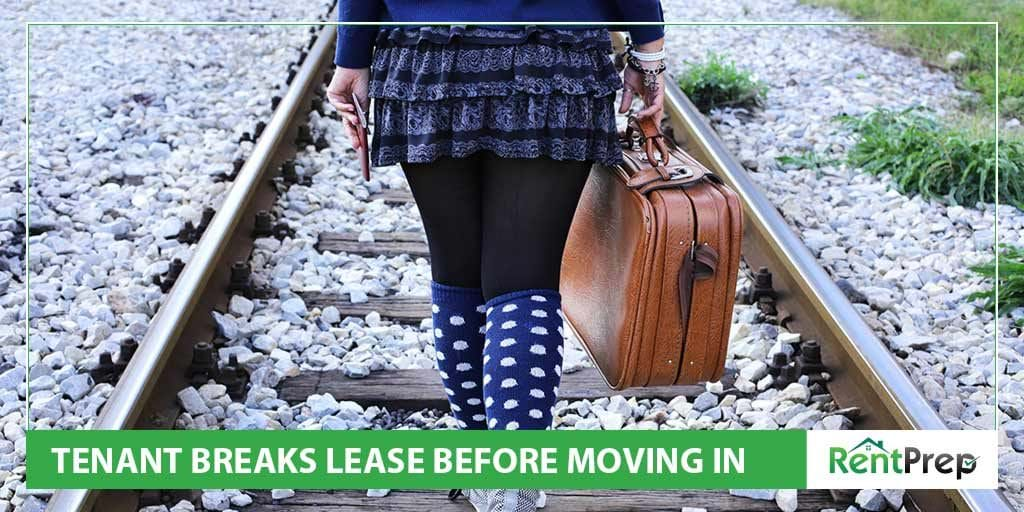Can You Back Out of a Pre Lease

Author
September 11, 2020
Posted On
Categories

Updated August 2021
So, you recently signed a new rental agreement with a tenant that is perfect for your rental. Days after signing the lease, the tenant breaks the lease before moving in. When a tenant changes their mind about renting from you, how does that affect a landlord, a tenant, and the overall business of a rental property? Perhaps the tenant got notice of a job transfer, encountered a family emergency, or simply got cold feet about moving into your rental property.
No matter what the circumstances, sometimes tenants change their minds about occupying a unit even before they move in. Learn what both of you are legally obligated to do when this unusual situation occurs so you can minimize the financial impact.
A Table Of Contents For Tenants Breaking The Lease Before Move-In
- What Happens When A Tenant Breaks Lease Before Moving In?
- Ask For Documentation
- Explain Next Steps
- Try To Find A New Tenant
- How To Write An Early Lease Termination Letter
- Adding An Early Termination Of Lease Clause
- Tenant Breaking A Lease Before Moving In: Landlord Options
- Allow Early Termination
- What Happens To Security Deposit When Tenant Breaks Lease?
- Apply The Security Deposit For Rent
- Collect Tenant Rent Separately
- Can You Back Out Of A Lease Within 3 Days?
- When Tenants Cancel Lease Before Moving In: FAQs
- Can you keep a security deposit if a tenant cancels the lease?
- Does Breaking A Lease Hurt A Tenant's Credit?
- Can A Tenant Change Their Mind Before Signing A Lease?
- Landlord's Rights When Tenant Break Lease Agreement
- Real-Life Example: Tenant That Wants To Break The Lease Early
What Happens When A Tenant Breaks Lease Before Moving In ?

Once the rental lease agreement has been signed, the landlord and the tenant have entered into a legally binding contract, whether or not the tenant actually occupies the unit.
If a tenant signed a lease but changed their mind about moving in, you must treat the notification as their intent to break the lease agreement .
Here is what you need to do when that happens:
Ask For Documentation
Ask the tenant to provide a written 30-day notice for your records that they will be breaking the lease.
Explain Next Steps
Explain to the tenant that they are legally liable for rent for the entire lease agreement; however, you will try to re-rent it as soon as possible as part of the good-faith effort required by most states. The tenant is responsible for paying rent until your property is rented out again, whether they are physically present at the unit or not.
Try To Find A New Tenant
Most states require a good-faith effort on your part to find a new tenant. This means that you should begin marketing the property immediately and sign a new lease agreement with a new tenant as soon as possible.
Once you have a new lease agreement in place, the old lease agreement is no longer valid. Even though the tenant signed a lease, but never moved in, we recommend signing an early lease termination letter with the former tenant. This will ensure that the terms of this termination are clearly documented.
How To Write An Early Lease Termination Letter
An early lease termination letter is an addendum to a lease agreement that is signed by both parties. This letter states that the lease agreement will be considered null and void as of a specific date. It should also include details of any fees owed and how they are to be collected.
It's important for the landlord to document everything, especially the early termination letter. You will need this documentation to track and control how much money gets tied up in this situation, and you may need the documents if you end up going to court over any disagreements.
This letter will serve as legal documentation for the end of the lease. If the tenant does not pay the fees owed, this letter will be useful in pursuing the collection of any overdue rent and fees. Any employed property manager can help with this process, but we also have a copy of an early termination letter you can customize.
Adding An Early Termination Of Lease Clause
If you are worried about a tenant backing out before they move in, it might be a good idea to make sure your standard lease has a clear termination clause in it. This clause can cover what will happen if the tenant wants to back out of the lease early.
Usually, these clauses allow tenants to pay a specific amount as a standard early lease termination fee . Once they pay this amount, they can be considered free from the obligation to pay any future rent, but they will still owe any rent that is back due unless another arrangement is organized.
Tenant Breaking A Lease Before Moving In: Landlord Options
While the step-by-step process given above is the standard procedure that can be followed when a tenant breaks a lease early before they move in, you have other options. Ultimately, it is up to you to decide which option suits your situation.
Most states require landlords to do their best to find a tenant as soon as possible; you must make a good-faith effort to do so.
If the rental property you are dealing with was difficult to rent or you made a lot of rental concessions in order to rent to this tenant, it is best to follow the standard protocol. This protocol simply follows the contract you and the tenant both signed. It ensures you will not lose out financially. While it may seem harsh, the tenant signed the legal contract as well as you. Here are a few tips for when a tenant comes to you saying, "I signed a lease, but changed my mind ."
Allow Early Termination

Does your lease agreement allow for early termination? If so, your tenant has the right to use this early termination clause at any time so long as they follow the protocol outlined in the lease agreement.
If they want to get out of an apartment lease before moving in, for example, they will be able to clearly see how to do this in their lease.
Usually, this means they will need to pay some fee in order to end the lease agreement early, and they may also need to forfeit their security deposit. Once the termination has occurred, both parties can continue with their business as usual.
If you are in a position where you can do so, it is usually easier to end the lease agreement without fighting for rent than it is to pursue rent collection from an unwilling tenant. However, every situation is different so you need to be careful about making this choice.
Tenants who get a job in a new city, lose their jobs and cannot make rent, or are otherwise in a changing situation out of their control may not be able to keep paying rent. Rather than holding onto the hope that they'll be able to find money to pay rent, it's usually best to cut your losses and move on.
If both parties agree, it is legal to end the lease agreement at any time. You can decide to make this choice if you feel it is not going to hurt your business too much.
What Happens To Security Deposit When Tenant Breaks Lease?
The security deposit (generally equal to two or three month's rent) is made for situations like this—to compensate you in the event of unpaid rent.
Because most landlords require tenants to pay the security deposit at the same time the lease is signed, it can help bridge the income gap between your tenant's first few months of re nt.
If you have collected the deposit from the tenant, you and the tenant have two options:
Apply The Security Deposit For Rent
You keep it, apply the security deposit toward rent owed until the property is re-rented, and then send the unused portion back to the tenant. The tenant doesn't pay rent unless the rent owed exceeds the total deposit. This route is risky because it may be difficult to collect or sue for rent from the tenant after the security deposit is used up.
Collect Tenant Rent Separately
You set it aside and the tenant pays rent each month until the property is rented again. Then, you send the deposit back in full, since there won't be any damages to the unoccupied unit. This route is safer for you because the tenant has the incentive to pay the rent in order to get the security deposit back in full. If the tenant fails, you can deduct rent from the security deposit anyhow.
Remember, however, that your local or state laws may have an effect on whether or not you can use the security deposit in this way. Breaking the lease typically enables the landlord to keep the security deposit, but there are some areas where the rules about security deposits are incredibly strict.
It is always a good idea to double-check your tenant state and local laws before using the security deposit to cover anything except damages made to the property.
Can You Back Out Of A Lease Within 3 Days?
When the tenant doesn't get their deposit refunded immediately or wants to give you an earful when you stand your ground on rent responsibility, they may invoke a "right to rescind."
This is referring to a consumer protection law that requires financial lenders to allow borrowers to back out of a loan under certain circumstances after three days.
Unfortunately for the tenant, this right does not relate in any way to lease agreements and rental properties.
If the tenant tries to convince you of this policy, go ahead and debunk the notion that there is a right to rescind or cancel a lease agreement within three days.
When Tenants Cancel Lease Before Moving In: FAQs
When a tenant decides to cancel a lease before ever moving onto the rental property, it can cause quite a bit of confusion, especially when it comes to a landlord's rights.
Can you keep a security deposit if a tenant cancels the lease?
In most cases, the landlord can keep the security deposit if a tenant backs out. The exact terms of whether or not this is possible will depend on two things:
- What is written in the lease agreement?
- What do state and local laws say about security deposits?
If your local laws allow you to use the security deposit to cover unpaid rent if the tenant backs out before moving in, you should consider writing this into your standard lease agreement. Having it included in the specific agreement that you and your tenant sign will make it easier to explain this to your tenant should this situation occur.
However, if you live somewhere that the security deposit can never be used to cover rent, it will need to be returned to the tenant in full once the lease agreement period is over. If you find yourself in this situation, it is likely that you will need to go to civil court to resolve the rent nonpayment and property abandonment .
From there, a judge can advise how to pursue rent collection and what to do with a security deposit.
Does Breaking A Lease Hurt A Tenant's Credit?
Tenants who are caught in a tricky situation may be worried about whether or not breaking the lease will affect their credit. Some may turn to you for advice. While you should point them to a financial expert for information, it is good to know the basics.
If a tenant backs out and does not pay rent after signing a lease agreement, they are still responsible for any unpaid rent. The landlord can file a suit to get that rent back. If they win the suit, they may then pass the debt to a collections agency. Unpaid debt that goes through a collections agency can have an effect on a tenant's credit score.
Ultimately, this means that a tenant's credit could be affected by them backing out of a lease agreement if they do not meet an agreeable resolution with the landlord or pay their owed dues.
Can A Tenant Change Their Mind Before Signing A Lease?
While it is frustrating, a tenant is allowed to change their mind at any time before signing a lease. Until the contract is signed, there is nothing binding them to rent the property, and they cannot be forced to do so.
If a tenant has already paid a security deposit before they change their mind, you should pay this back to them in full if they do not sign the lease. There was no agreement in place, so them giving you the security deposit early was a mistake on their part, but it would be questionable to keep this money.
Once they've signed a lease but don't want to move in, however, it is within your rights to pursue the collection of rent in some way.
Landlord's Rights When Tenant Breaks Lease Agreement
When your tenant wants to terminate the lease agreement before occupying the rental property, you can work with them to minimize the financial impact for both of you.
As the landlord, you are entitled to keep the security deposit, and are entitled to collect rent until the unit re-rents. However, it is your duty to minimize the time it takes to re-rent and find a replacement tenant.
As frustrating as this situation can be, it's always a good idea to try to keep things moving to a new tenant rather than waiting for the former tenant to pay you back. As with much overdue rent, it can be very hard to collect. Focus on the future as much as possible.
Real-Life Example: Tenant That Wants To Break The Lease Early
In Episode #164 of the RentPrep For Landlords Podcast, we dive into different issues that landlords call our company about. On a recent podcast, we actually discussed a real life example of a tenant wanting to break the lease before moving in .
You can tune in below to hear how that story progressed.
Subscribe: Apple Podcasts | Android | Google Play | Stitcher | TuneIn | RSS
Can You Back Out of a Pre Lease
Source: https://rentprep.com/leasing-questions/tenant-breaks-lease-before-moving-in/
0 Response to "Can You Back Out of a Pre Lease"
Post a Comment